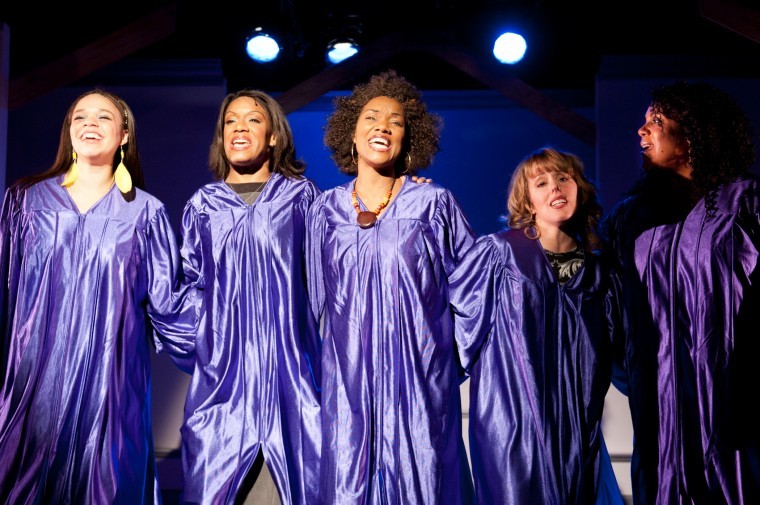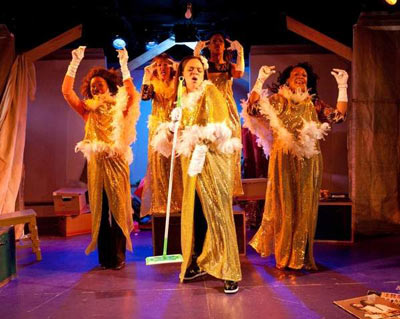SISTAS Offers 90 Minutes of Great Songs & Powerful Messages

From left, Lexi Rhoades, Tracey Conyer Lee, April Nixon, Amy Goldberger and Jennifer Fouche star in “Sistas: The Musical.”
/ COURTESY Russ Roland
“Sisters Are Doing It For Themselves,” Eurythmics and Aretha Franklin
“Now this is a song to celebrate / The conscious liberation of the female state! / Mothers — daughters and their daughters too. / Woman to woman We’re singin’ with you.”
APP.com (Asbury Park Press) – April 2012
Dorothy Marcic knows a thing or two about women and popular music.
Her first musical, “RESPECT: A Musical Journey of Women,” tells the story of women from 1900 to the present. The black cast members of that show asked Marcic to write a similar piece geared toward black women.
The result is “Sistas: The Musical,” an inspiring musical journey full of laughter and a few tears.

April Nixon, from left, Amy Goldberger, (middle), Lexi Rhoades, Tracey Conyer Lee and Jennifer Fouche during a Motown medley. / COURTESY RUSS ROLAND
The 90-minute show covers everything from segregation to the women’s movement to the meaning of love and control. Featuring songs from Bessie Smith to Mary J. Blige, “Sistas” is based on a series of interviews conducted with black women over a six-year period. A hit during last summer’s Midtown International Theater Festival, it is now playing at St. Luke’s Theatre on 46th Street.
The story begins with a family going through Grandma Alice’s attic. Grandma recently died, and Simone, Roberta, Gloria, Heather and Tamika (Lexi Rhoades) are going through her things. While they are there, they discover a lot about each other as they look for an appropriate song to sing to honor Grandma at her funeral.
Nixon leads the cast as Simone (April Nixon), the eldest sister and a professor who is raising Tamika, her teen daughter, by herself. While the sisters are all independent women, Simone comes across as the rock and protector, the voice of reason full of kindness and wisdom. And yet she does let loose, leading the group in Gloria Gaynor’s “I Will Survive,” complete with boas. It’s lots of fun.
The most interesting character of the five is Roberta (Jennifer Fouche). She’s angry at the world, the justice system and seems to want nothing to do with religion. As the story continues, we learn why she is so bitter and frustrated. Throughout the show, Fouche is a real presence. One of the most powerful moments is her rendition of Billie Holiday’s “Strange Fruit.”
Marisha Wallace (filling in during a recent performance for Tracey Conyer Lee) impresses with her big gospel voice, and she believably portrays Gloria’s love for Jesus. Still, she seems too young for the part. The chemistry between her and the other cast members was strong, but next to Nixon and Fouche, she seems out of place.
As Tamika, Lexi Rhoades convinces as the girl who just wants to have fun. She is at her best singing Erykah Badu’s “Tyrone” — when she breaks up with her no-good boyfriend. It’s one of the funniest moments in the play. Rhoades struggles, though, with “I Have Nothing.” Nobody expects her to have Whitney Houston’s range, but director Kenneth Ferrone should realize her limitations.
As Heather, the only white girl on stage, Amy Goldberger inadvertently entertains the audience with some of her moves. At the same time, she also puzzles/annoys them with her character’s statements on race. Heather is not a bigot, not even close. After all, she married into the family. But her experiences are far different. She does create some tension with her sisters-in-law, but it never lasts long. Goldberger attempts to be soulful at times, which is not wise. She’s fine singing backup, especially during the Motown medley.
Credit must be given to the fine three-piece band tucked off-stage to the left of the audience: Musical director Nicholas Cheng on keyboard, Matt Cusack on bass and Brian Adler on percussion.
At the end of the show, the enthusiastic Marcic walked on stage wanting everyone to spread the word about “Sistas.” Deep down, however, she must have realized that her words were unnecessary. The audience, who often sang and clapped along with the cast, was clearly touched and moved by the show’s music and messages of love, family, faith, independence and justice.
Put another way: “Sistas” is doing it for itself.
